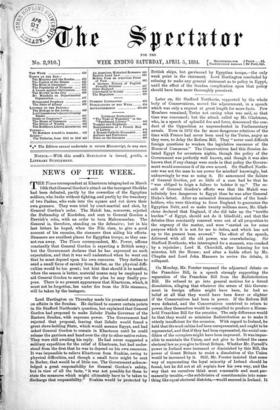Later on, Sir Stafford Northcote, supported by the whole body
of Conservatives, moved the adjournment, in a speech which was only a request at great length for more facts. Few Members remained, Tories not caring what was said, so that time was consumed ; but the attack called up Mr. Gladstone, who, in a speech of splendid fire and force, denounced the con- duct of the Opposition as unprecedented in Parliamentary annals. Even in 1832 the far more dangerous relations of the time with France had never been used by the Tories, angry as they were, to delay the Reform Bill. They "never used difficult foreign questions to weaken the legislative resources of the House of Commons." The Conservatives had this Session de- bated Egypt for seventeen nights, though the policy of the Government was perfectly well known, and though it was also known that if any change were made in that policy the Govern- ment would announce it of its own accord. Sir Stafford North- cots was not the man to use power for mischief knowingly, but unknowingly he was so using it. He announced the failure of General Gordon, yet so little Of a case had he that he "was obliged to feign a failure to bolster it up." The re- sult of General Gordon's efforts was that the Mahdi was infinitely less dangerous to Egypt than he was after General Hicks's defeat. After an animated denunciation of the bond- holders, who were thirsting to force England to guarantee the Egyptian Debt, and so make twenty millions more, Mr. Glad- stone declared that England, if she did take up the "terrific burden" of Egypt, should not do it blindfold; and that the debates thus constantly renewed were out of all proportion to the urgency of the matter, and were "Carried on for some purpose which it is not for me to define, and which has not up to the present been avowed." The effect of the speech, delivered with all the old power, was overwhelming. Sir Stafford Northcote, who interrupted for a moment, was crushed by a rejoinder ; Lord R. Churchill, after listening for ten minutes, left the House ; and after a feeble effort by Mr. Chaplin and Lord John Manners to revive the debate, it collapsed.














































